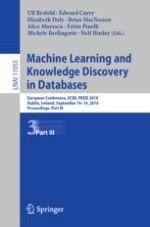2019 | OriginalPaper | Buchkapitel
Solving the False Positives Problem in Fraud Prediction Using Automated Feature Engineering
verfasst von : Roy Wedge, James Max Kanter, Kalyan Veeramachaneni, Santiago Moral Rubio, Sergio Iglesias Perez
Erschienen in: Machine Learning and Knowledge Discovery in Databases
Aktivieren Sie unsere intelligente Suche, um passende Fachinhalte oder Patente zu finden.
Wählen Sie Textabschnitte aus um mit Künstlicher Intelligenz passenden Patente zu finden. powered by
Markieren Sie Textabschnitte, um KI-gestützt weitere passende Inhalte zu finden. powered by
